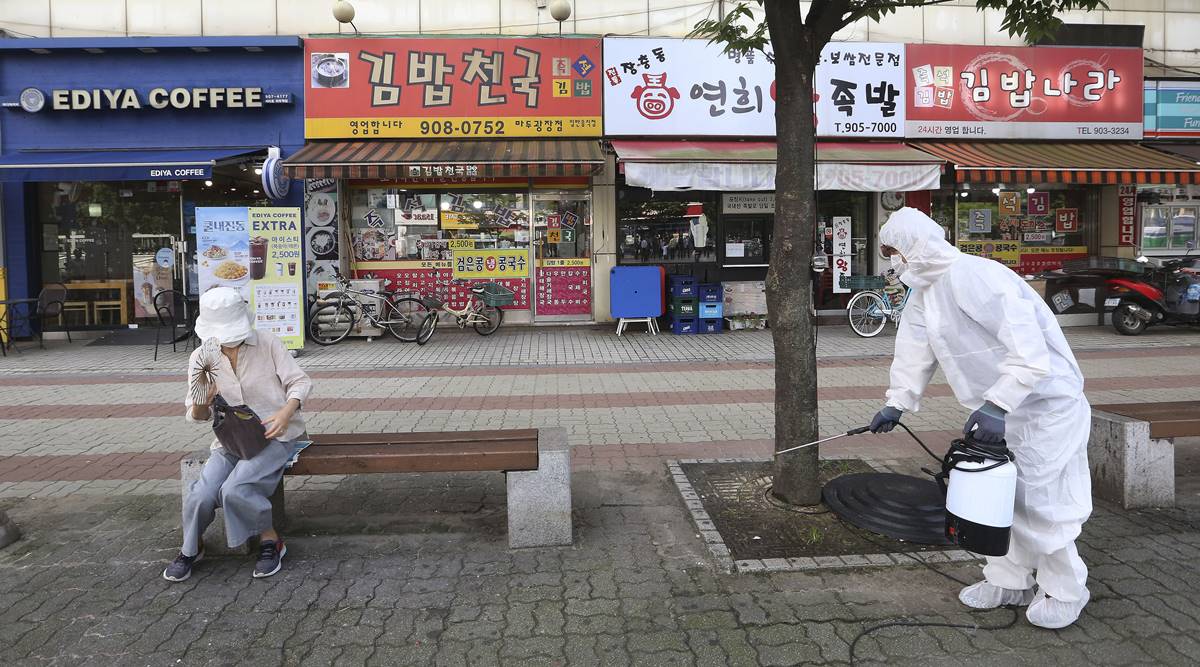 A worker disinfects as a precaution against the coronavirus on a street in Goyang, South Korea, Tuesday, Aug. 25, 2020. (AP Photo/Ahn Young-joon)
A worker disinfects as a precaution against the coronavirus on a street in Goyang, South Korea, Tuesday, Aug. 25, 2020. (AP Photo/Ahn Young-joon)Coronavirus Global Updates: Over 23.65 million cases of coronavirus have been confirmed in more than 210 countries across the world, according to a Reuters tally. Nearly 811,895 people have succumbed to the disease. Over 15 million people have recovered from the infection.
The World Health Organisation (WHO) said that the COVID-19 pandemic is still expanding, but the rise in cases and deaths has slowed globally, except for Southeast Asia and the eastern Mediterranean regions.
In its latest epidemiological update issued on Monday, the WHO said that the Americas remains the hardest-hit region, accounting for half of the newly reported cases and 62 per cent of the 39,240 deaths worldwide in the past week.
“Over 1.7 million new COVID-19 cases and 39,000 new deaths were reported to WHO for the week ending 23 August, a 4% decrease in the number of cases and (a 12% decrease) in the number of deaths compared to the previous week,” the WHO said.
Southeast Asia, the second most affected region, reported a jump accounting for 28 per cent of new cases and 15 per cent of deaths, it said. India continues to report majority of the cases, but the virus is also spreading rapidly in Nepal.
Lebanon, Tunisia and Jordan reported the highest increase in cases compared to the previous week, the WHO said. “In the European region, the number of cases reported has consistently increased over the last three weeks,” it added.
Here are the top developments from across the world:
Germany warns against travel to southeast France
Germany is warning against travel to the Paris region and part of southeastern France as coronavirus infections rebound.
The warning against nonessential travel issued by the foreign ministry on Monday evening came as Germany’s national disease control center added the Ile-de-France and Provence-Alpes-Cote d’Azur regions to a growing list of “risk areas”. The list currently includes most of the world outside the European Union.
Inside the EU, it now includes all of Spain apart from the Canary Islands, parts of Croatia, Bulgaria, Romania and Belgium, and the two French regions.
Turkey to allow limited fan attendance at football matches from October
Turkey will let limited numbers of fans attend football matches from October, the Turkish Football Federation said in a statement on Tuesday, rolling back some curbs imposed due to the coronavirus pandemic.
Turkey halted its 2019-20 season in March due to the virus and resumed matches in June without spectators. Last month, the top-tier Super League concluded with Istanbul Basaksehir winning the title for the first time, breaking the dominance of the “Big Three” in Turkey – Fenerbahce, Galatasaray and Besiktas.
 FILE – In this Sept. 8, 2019, file photo, fans cheer in U.S. Bank Stadium during the second half of an NFL football game between the Minnesota Vikings and the Atlanta Falcons, in Minneapolis. The Minnesota Vikings will play at least their first two home games without fans in attendance. (AP Photo/Bruce Kluckhohn, File)
FILE – In this Sept. 8, 2019, file photo, fans cheer in U.S. Bank Stadium during the second half of an NFL football game between the Minnesota Vikings and the Atlanta Falcons, in Minneapolis. The Minnesota Vikings will play at least their first two home games without fans in attendance. (AP Photo/Bruce Kluckhohn, File)
British PM Johnson to consider masks at schools
British Prime Minister Boris Johnson has said his government is ready to advise high school students in England to wear face masks in some contexts if the medical evidence deems it necessary in containing the spread of the coronavirus. Schools in England are due to reopen in the upcoming weeks.
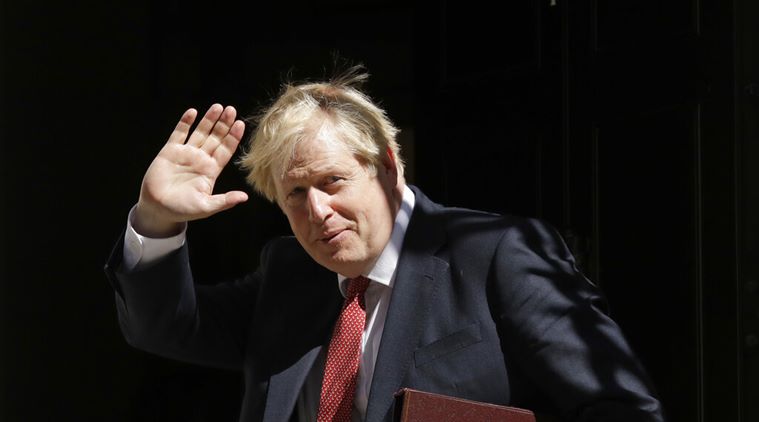 British Prime Minister Boris Johnson (AP Photo/Matt Dunham)
British Prime Minister Boris Johnson (AP Photo/Matt Dunham)
His government, which oversees schools in England, has come under increasing pressure to change its advice on masks in certain school settings following the decision by the Scottish government to require students over 12 to wear masks. Johnson says if “we need to change the advice then of course we will”.
Spanish Prime Minister offers military for contact tracing
Spanish Prime Minister Pedro Sanchez has offered officials running the countrys 17 regions help from the military to conduct coronavirus contact tracing. He has pledged to declare regional emergency orders if the expansion of the pandemic continues facilitating regional officials ability to issue lockdowns and restrict mobility.
Sanchez said the infection rate is preoccupying but called it far from the situation in mid-March when the government imposed a state of emergency.
Spain is grappling to control transmission of the virus with a new wave hitting the country only days before the opening of the school year. Sanchez encouraged Spaniards to download a contact tracing mobile app that the government is rolling out.
Hong Kong to ease social distancing norms later this week
Hong Kong will ease some social distancing measures later this week, allowing beauty salons and cinemas to reopen and relaxing an evening dine-in ban as daily coronavirus infections in the city dwindled.
Restaurants, now banned from providing dine-in services after 6 pm, will be allowed to serve customers until 9 pm starting Friday. Businesses such as cinemas, beauty salons, and some outdoor sports venues will be allowed to reopen and residents will no longer be required to wear masks when exercising outdoors or while in country parks.
Gaza in lockdown to try to contain its first COVID-19 outbreak
A lockdown took hold in Gaza on Tuesday after confirmation of the first cases of COVID-19 in the general population of the Palestinian enclave, whose restricted borders have spared it from wide infection.
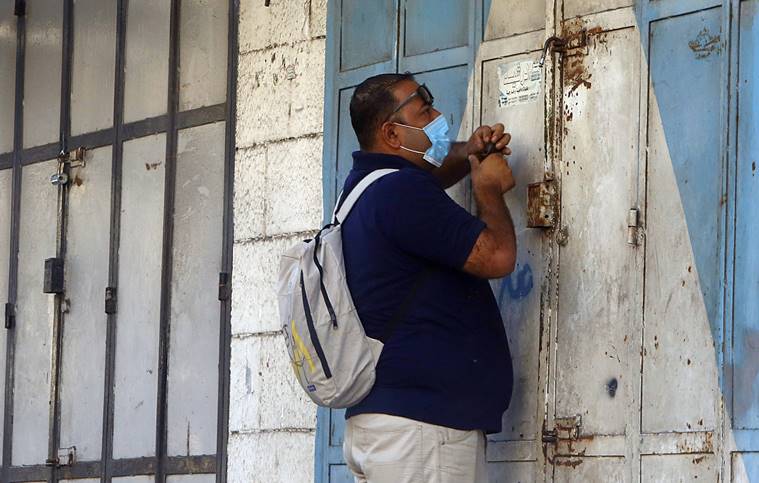 A Palestinian man wears a face mask as he locks a shop during a 48 hour lockdown imposed following the discovery of the first coronavirus cases in the Gaza Strip, Tuesday, Aug. 25, 2020. (AP Photo/Hatem Moussa)
A Palestinian man wears a face mask as he locks a shop during a 48 hour lockdown imposed following the discovery of the first coronavirus cases in the Gaza Strip, Tuesday, Aug. 25, 2020. (AP Photo/Hatem Moussa)
Health authorities in the Hamas Islamist-run territory of two million people are concerned over the potentially disastrous combination of poverty, densely populated refugee camps and limited hospital facilities in dealing with an outbreak.
A government spokesman said four cases of the coronavirus were confirmed in a single family in a refugee camp, the first in Gaza that did not involve people quarantined in border facilities after crossing into the coastal enclave from Egypt and Israel.
AstraZeneca begins COVID-19 dual-use antibody drug trial in UK
UK-headquartered biopharmaceutical giant AstraZeneca on Tuesday announced the start of clinical trials for an antibody drug which offers dual hope to treat and prevent COVID-19.
The drug known as AZD7442 has the potential to be given as a preventative option for people exposed to the coronavirus, and to treat and prevent disease progression in patients already infected by the deadly virus.
The Cambridge-based British-Swedish multinational AstraZeneca, which is also working with the University of Oxford on a vaccine to combat the coronavirus, said the drug is a combination of two monoclonal antibodies (mAbs) and the first participants have been dosed with it for the Phase I trial.
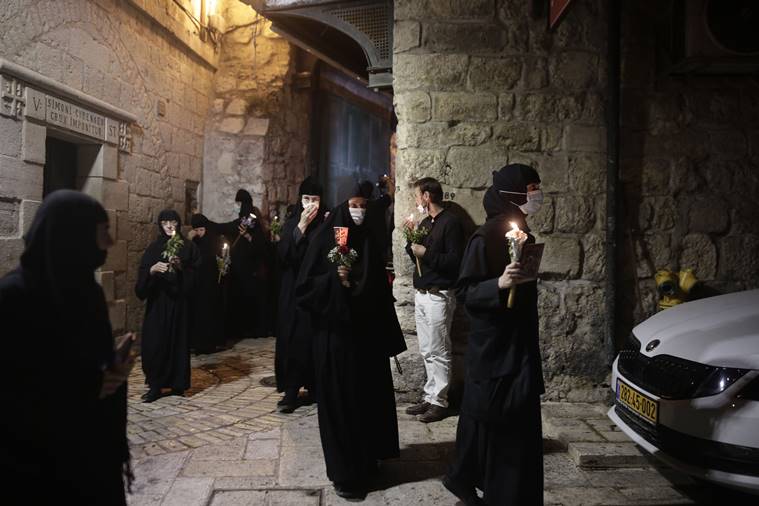 Orthodox nuns carry candles and bouquets of flowers and basil as they walk in a procession in Jerusalem’s Old City to bring the icon of the Virgin Mary from the Church of the Holy Sepulchre to the tomb where she is believed to be buried, early Tuesday, Aug. 25, 2020. (AP Photo/Maya Alleruzzo)
Orthodox nuns carry candles and bouquets of flowers and basil as they walk in a procession in Jerusalem’s Old City to bring the icon of the Virgin Mary from the Church of the Holy Sepulchre to the tomb where she is believed to be buried, early Tuesday, Aug. 25, 2020. (AP Photo/Maya Alleruzzo)
Two European patients re-infected with coronavirus
Two European patients are confirmed to have been re-infected with the coronavirus, according to regional public broadcasters, raising concerns about people’s immunity to the virus as the world struggles to tame the pandemic, Reuters reported.
The news follows a report this week by researchers in Hong Kong about a man there who had been re-infected four and a half months after being declared recovered. That has fuelled fears about the effectiveness of potential vaccines against the virus, though experts say there would need to be many more cases of re-infection for these to be justified.
Broadcasters said on Tuesday a patient in the Netherlands and another in Belgium had also been re-infected with the virus that has led to hundreds of thousands of deaths worldwide and crippled the global economy.
Germany on ‘road to recovery’ as business morale brightens further
German business morale improved more than expected in August as both manufacturing and services picked up steam, a survey showed on Tuesday, boosting hopes that Europe’s largest economy is set for a strong recovery following the massive coronavirus shock.
The Ifo institute said its business climate index rose to 92.6 from a downwardly revised 90.4 in July. This was the fourth monthly increase in a row and came in better than economists’ expectations for 92.2.
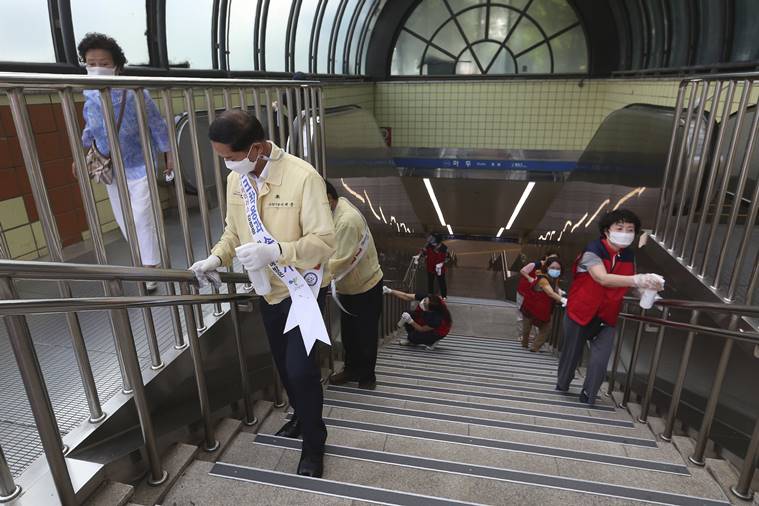 Government officials and volunteers disinfect as a precaution against the coronavirus at a subway station entrance in Goyang, South Korea, Tuesday, Aug. 25, 2020. South Korea is closing schools and switching back to remote learning in the greater capital area as the country counted its 12th straight day of triple-digit daily increases in coronavirus cases. (AP Photo/Ahn Young-joon)
Government officials and volunteers disinfect as a precaution against the coronavirus at a subway station entrance in Goyang, South Korea, Tuesday, Aug. 25, 2020. South Korea is closing schools and switching back to remote learning in the greater capital area as the country counted its 12th straight day of triple-digit daily increases in coronavirus cases. (AP Photo/Ahn Young-joon)
Indonesia records over 2,400 new COVID-19 cases
Indonesia reported 2,447 new coronavirus infections on Tuesday, taking the total number of cases to 157,859, data from the country’s Covid-19 taskforce showed, Reuters reported.
Ninety-nine additional deaths were reported, pushing the death toll to 6,858, the highest coronavirus death toll in Southeast Asia.
We have to make this ‘Chinese Virus’ go away: Donald Trump
Americans have to “make this China virus go away” and it is happening, US president Donald Trump said, as he thanked the frontline workers for their incredible efforts to combat the coronavirus pandemic. Trump appeared in a taped Oval Office conversation with a group of frontline workers – doctors, nurses, firemen, policemen, postal workers.
However, this was not the first time Trump called the novel coronavirus as China’s virus. In March, he had said that China is responsible for the spread of the novel coronavirus and called it the “Chinese Virus”. He later insisted the term was accurate because the virus originated in the central Chinese city of Wuhan.
The United States has reported over 5 million confirmed cases of coronavirus and at least 170,000 deaths so far.
South Korea closes schools again amid spike in cases
South Korea is closing schools and switching back to remote learning in the greater capital area as the country reported triple-digit daily increase in coronavirus cases for the 12th straight day, the Associated Press reported.
Education Minister Yoo Eun-hae said Tuesday that at least 193 students and teachers were found infected with the virus over the past two weeks in the Seoul metropolitan region, where a viral surge has threatened to erase the country’s hard-won epidemiological gains.
Yoo said most children at kindergartens, elementary, middle and high schools will receive online classes at least until September 11. High school seniors will continue to go to school so their studies are not disrupted ahead of the crucial national college exams.
South Korea’s Centre for Disease Control and Prevention reported 280 new cases of COVID-19, pushing the 12-day total to 3,175. The country now has 17,945 confirmed cases so far, including 310 deaths.
South Korea has since Sunday banned large gatherings, shut down nightspots and churches and removed fans from professional sports nationwide. Officials say the country could be forced to elevate social distancing restrictions if the virus doesn’t slow later this week.
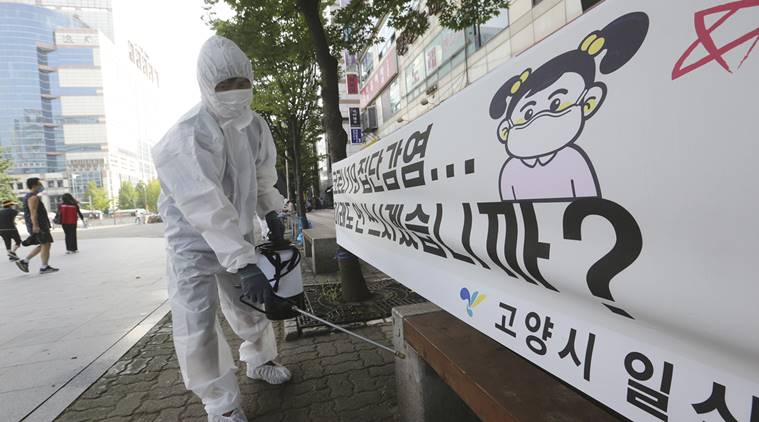 A worker disinfects as a precaution against the coronavirus on a street in Goyang, South Korea, Tuesday, Aug. 25, 2020. (AP Photo)
A worker disinfects as a precaution against the coronavirus on a street in Goyang, South Korea, Tuesday, Aug. 25, 2020. (AP Photo)
Virus tests for students returning to Beijing universities
Beijing universities are preparing to administer virus tests to students returning to the city’s campuses, the Associated Press reported.
The cost of testing all 600,000 students will be born by the universities themselves, according to the Beijing Municipal Education Commission.
University classes are scheduled to begin Sept 9. Approximately 75 per cent of Chinese students in lower grades returned to class by last month, many on staggered schedules. The rest are expected to return by this week or on Sept 1.
China’s National Health Commission on Tuesday reported no local infections for the ninth straight day and said 14 new cases have been detected in travelers arriving from abroad.
 Workers take delivery of supplies in Beijing on Aug. 20, 2020. (AP Photo)
Workers take delivery of supplies in Beijing on Aug. 20, 2020. (AP Photo)
New school year begins in Mexico
The Mexican government Monday attempted to start a new school year despite the challenges of the coronavirus pandemic, as millions of school children returned to classes but not schools, reported the Associated Press.
The government enlisted the country’s largest private television companies to dedicate channels to school programming around the clock. Education officials developed schedules giving students at various levels multiple opportunities to watch their classes.
Education Secretary Esteban Moctezuma said officials decided to rely on television because it has a far greater penetration than the internet.
 Denisse Leal dispenses alcohol gel to a commuter as she and her husband Mario Diaz ride a subway car in Santiago, Chile, Monday, Aug. 24, 2020. (AP Photo)
Denisse Leal dispenses alcohol gel to a commuter as she and her husband Mario Diaz ride a subway car in Santiago, Chile, Monday, Aug. 24, 2020. (AP Photo)
Coronavirus restrictions further eased in New York
Coronavirus restrictions were cautiously eased in New York on Monday, allowing museums across New York and gyms in some parts of the state outside of New York City to reopen, the Associated Press reported.
Museums will face restrictions including timed ticketing and 25 per cent occupancy, according to guidelines announced by Governor Andrew Cuomo.
NYC museums that will open over the next few weeks include the Metropolitan Museum of Art on Aug. 29 and the American Museum of Natural History on September 9.
While Cuomo said gyms and fitness centers could open at 33 per cent capacity from Monday, New York City Mayor Bill de Blasio said the city’s gyms would stay closed until at least September 2.
State health officials have reported an infection rate below 1 per cent every day for over than two weeks.